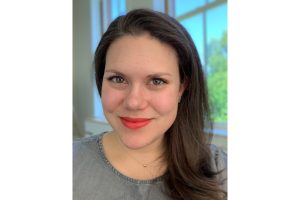
What is your current position?
I’m an Associate Professor of Civil and Environmental Engineering at University of Massachusetts Amherst. I specialize in structural engineering and mechanics.
Why did you pursue this career path? What motivated and attracted you to it?
I’m a structural engineer because I love looking at buildings! The pieces fell into place when I began questioning how they stand up. I chose an academic career because I’m passionate about advancing the profession through research. I also thought an academic career was the best way I could apply my skills and make an impact on the world. There are a lot of ways to make an impact—this was mine.
What attributes, skills, or knowledge are needed to be successful in your field?
Aside from technical knowledge, passion, enthusiasm, work ethic, and communication skills. I’m a believer in a liberal arts education for engineers to the extent possible—it makes us better engineers, more able to communicate and solve engineering challenges holistically.
What are the biggest challenges in your field – not just for you, but for all leaders in this area?
How to convince people to care about problems that may not impact us for 100 years. How to inspire change when the status quo works right now.
Describe a significant professional accomplishment that makes you proud.
It’s hard to beat watching your students succeed. It sounds trite for me to say as an educator, but it really does make me immensely proud to see them accomplishing their goals. Other than that, I’m proud of a recent career transition I’ve made. Most of my training and first five years of my career as an independent researcher was in earthquake engineering and while I still do quite a bit of work in it and enjoy it, have pivoted towards sustainability research. It was always a goal of mine to contribute in building sustainability and at some point I realized I was actually doing it, not just trying to do it.
What role has your educational background played in your success?
It’s everything! I draw upon my education daily. Hourly, even! It trained me to think, and solve problems not currently solved. It trained me to take a large, complex problem and break it into smaller, achievable tasks.
We would love to hear about any noteworthy professors or pivotal experiences you had at the Whiting School.
There can be none more noteworthy than my PhD advisor, Ben Schafer. I could share a lot of inspirational stories of him providing just the advice I needed in the moment, and making me the researcher and educator I am today, but instead I’ll share this one: When I was in the last year of my PhD, I had to work in another lab for five months, requiring me to uproot and live in another state. Ben and I were always in close contact, but he’d also come up and visit for a very intense day at the lab. He’d fly in and out the same day, and we’d often end up frantically working side-by-side in my little gray windowless cubicle to analyze our newly-collected data. It was intensely intellectually stimulating and felt like we were going a thousand miles a minute with our hair on fire. We had a blast!
What advice would you offer students preparing for a career in your field?
Make sure you like it! Try lots of things—courses, research, internships, volunteer work—and talk to a lot of people. Go down internet rabbit holes and wild goose chases.